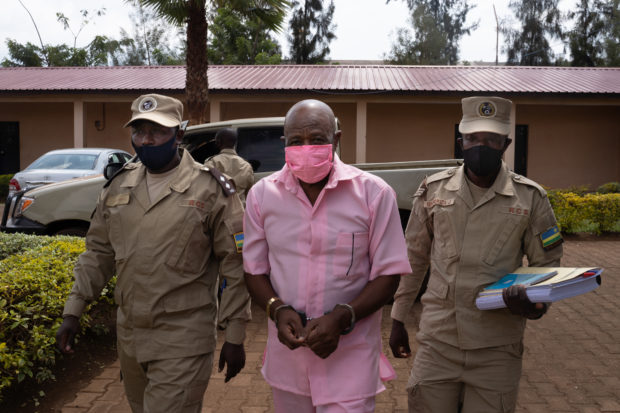‘Hotel Rwanda’ hero convicted on terror charges

(FILES) In this file photo taken on October 02, 2020, “Hotel Rwanda” hero Paul Rusesabagina (center) in the pink inmate’s uniform arriving at Nyarugenge Court of Justice in Kigali, Rwanda, surrounded by guards of Rwanda Correctional Service (RCS). (Photo by Simon Wohlfahrt / AFP)
Kigali, Rwanda — Paul Rusesabagina, the “Hotel Rwanda” hero who became a fiercely outspoken government critic, was found guilty of terror charges on Monday after what his supporters labeled a politically motivated show trial.
He was convicted by a high court in Kigali of forming a rebel group blamed for the deadly gun, grenade, and arson attacks in Rwanda in 2018 and 2019.
“He founded a terrorist organization that attacked Rwanda, he financially contributed to terrorist activities,” Justice Beatrice Mukamurenzi said at the end of a seven-month trial.
Rwandan prosecutors have sought a life sentence for Rusesabagina, the 67-year-old former hotelier credited with saving over 1,200 lives during the country’s 1994 genocide, and whose actions inspired the Hollywood film.
Neither Rusesabagina, whose family has raised concerns about his health, nor his lawyers were in court for the verdict. He is expected to appeal.
Article continues after this advertisementThe 20 other defendants in the case, handcuffed and dressed in pale pink prison uniforms, were brought to the court for the session.
Article continues after this advertisementSecurity forces were deployed both in and around the court, which was packed with journalists and diplomats from foreign embassies.
Rusesabagina, who used his fame to denounce Rwandan leader Paul Kagame as a dictator, has been behind bars since his arrest in August 2020 when a plane he believed was bound for Burundi landed instead in Rwanda’s capital Kigali.
His family says Rusesabagina was kidnapped and had rejected the nine charges against him as payback by a vengeful government for his outspoken views.
Earlier this month, Kagame dismissed criticism of the case, saying Rusesabagina was in the dock not because of his fame but over the lives lost “because of his actions”.
‘Lack of independence’
The trial opened in February but the Belgian citizen and US green card holder has boycotted it since March, accusing the court of “unfairness and a lack of independence”.
The United States — which awarded Rusesabagina its Presidential Medal of Freedom in 2005 — along with the European Parliament and Belgium have been among those to voice concerns about his transfer to Rwanda and the fairness of his trial.
Kagame’s government accused Rusesabagina of supporting the National Liberation Front (FLN), a rebel group blamed for attacks in 2018 and 2019 that killed nine people.
He denied any involvement in the attacks but was a founder of the Rwandan Movement for Democratic Change (MRCD), an opposition group of which the FLN is seen as the armed wing.
“MRCD-FLN committed terror acts. MRCD cannot be separated from military acts” of FLN, said judge Mukamurenzi.
“The court finds that Rusesabagina’s role in founding the FLN, provision of funds to the rebels, purchase of communication tools for the rebels all constitute the crime of committing terrorism.”
During the trial, his co-defendants gave conflicting testimony about the level of Rusesabagina’s involvement with the FLN and its fighters.
Disillusioned
Rusesabagina was the former manager of the Hotel des Mille Collines in Kigali, where he sheltered hundreds of guests during the genocide that left 800,000 people dead, mostly ethnic Tutsis.
A decade later the American actor Don Cheadle played Rusesabagina, a moderate Hutu, in the Oscar-nominated blockbuster that brought his story to an international audience.
Rusesabagina soon became disillusioned with the new Tutsi-dominated government led by Kagame, the rebel leader-turned president whose forces ended the mass killings.
He accused Kagame of authoritarian tendencies and left Rwanda in 1996, living in Belgium and then the United States.
Abroad, he used his global platform to crusade for political change in Kigali and developed close ties with opposition groups in exile.
His family, who have campaigned globally for his release, say Rusesabagina is a political prisoner and accuse the Rwandan authorities of torturing him in custody.
The Hotel Rwanda Foundation, which supports Rusesabagina, earlier this month described the court proceedings as a “show trial” and said the government had failed to provide any credible evidence against him.
“Paul’s family and team knew that he would be declared ‘guilty’ the moment he was kidnapped -– no trial was needed,” it said.
In July, meanwhile, an international media investigation claimed that Rusesabagina’s daughter Carine Kanimba was spied on using Pegasus malware developed by Israeli company NSO.
Investigators confirmed that a cell phone belonging to Kanimba, a US-Belgian dual national, had been compromised multiple times.